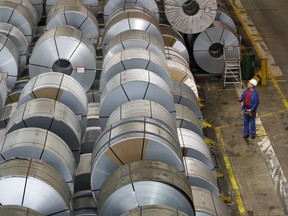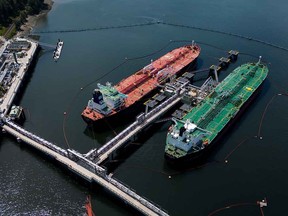And five reasons Donald Trump really wants to take over Canada
Article content
United States President Donald Trump thinks the rest of the world is ripping off the U.S., when the reason for its trade deficits reflects the fact that Americans are spending more of their after-tax incomes than virtually every other country on the planet.
Article content
Article content
The personal savings rate scale is at the very low end of the global range. You cannot, at the same time, have a society where economic success depends on mass consumerism that will ever not coexist with a trade deficit. What part of this do Trump and his team not comprehend?
Advertisement 2
Article content
As part of this consumerism, the U.S. is the only major country with neither a national sales tax nor a value-added tax. It is, therefore, completely natural for a country that pursues consumer-oriented spending to be the one with trade deficits.
The balance of payments must always balance, so if Trump crushes the current account deficit, he ipso facto crushes the capital account surplus. That, in turn, means financial conditions will have to tighten.
Every action has an equal and opposite reaction. The Trump administration could well force a voluntary debt restructuring, but that doesn’t address the underlying issue, which is that even excluding interest costs, the deficit would top US$1 trillion.
And the deficit isn’t because the U.S. is too generous to the rest of the world. That is small potatoes, but it plays well in Peoria. The ticking time bomb is aging demographics and the implications on entitlement spending, which Trump on the campaign trail said he would never touch. Everything else on the budget file is tied for a distant second.
There is growing talk that the administration is going to revalue gold reserves to help pay off some of the debt along with a plan to encourage non-residents to swap their existing holdings of U.S. Treasury securities for a century bond with a zero per cent coupon. Good luck.
Article content
Advertisement 3
Article content
But the problem is that none of these gimmicks change behaviour, and I am talking about a culture of overspending relative to domestic national income that is the root cause of the ongoing deficits.
Trump is also eying Canada’s vast resources. To be sure, he is not going to invade Canada (nor could he on his own), but he does intend to apply economic pressure in a bid to bring the country under the U.S. umbrella (amazingly, polls show that anywhere from seven per cent to 20 per cent of Canadians would not mind one bit being part of the U.S. — clearly desiring a strong currency, lower tax rates and any reason to feel patriotic).
This is not the first time that the U.S. has tried this: think of why Sir John A. Macdonald built the east-west national railway to begin with, the War of 1812 and the Annexation Bill of 1866, which was introduced in July of that year in the House but never passed.
The overriding question is why would Trump want Canada? He doesn’t seem to like the people. He doesn’t seem to like the politicians. He doesn’t seem to like the institutions. So, what does he want? The vast resources. Here is what Canada has that he desperately wants access to:
Advertisement 4
Article content
- 318 billion trees (30 per cent of the world’s timber);
- 164 billion barrels of proven oil reserves (nearly 10 per cent of the world’s supply, ranking fourth on the planet);
- 34 critical minerals (sixth most in the world — everything from cobalt to graphite to chromium to nickel to potash to lithium to manganese to uranium — Canada is a global mining powerhouse, ranking in the top five of world production);
- Seven per cent of the world’s renewable fresh water;
- Access to the Arctic since 40 per cent of Canada’s land mass is in the Arctic.
In sum, Canada has net national wealth estimated at $19 trillion and a very strong balance sheet that America would surely covet — not too shabby for a population of a bit more than 40 million.
Canada, in other words, is Greenland on steroids. Watch and see what concessions are going to very likely be made next year when the United States-Mexico-Canada Agreement comes up for renegotiation.
Recommended from Editorial
-

Better ways for Canada to fight back than full-on trade war
-

Investors should leave New York and come to Toronto
-

Canada is in crisis, but maybe not for much longer
David Rosenberg is founder and president of independent research firm Rosenberg Research & Associates Inc. To receive more of David Rosenberg’s insights and analysis, you can sign up for a complimentary, one-month trial on the Rosenberg Research website.
Bookmark our website and support our journalism: Don’t miss the business news you need to know — add financialpost.com to your bookmarks and sign up for our newsletters here.
Article content
U.S. blames others for financial mess it created: David Rosenberg
2025-02-11 15:39:50







